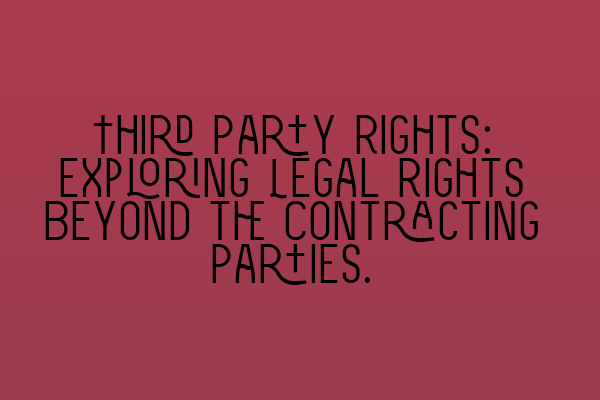Third Party Rights: Exploring Legal Rights Beyond the Contracting Parties
In contract law, the focus is often on the rights and obligations of the parties who are directly involved in the contract. However, it is important to recognize that there may be situations where third parties have rights and may enforce those rights under certain circumstances. These rights, known as third party rights, can significantly impact the parties involved in a contract and can even lead to legal disputes if not properly understood and addressed.
Before we dive into the complexities of third party rights, let’s briefly touch upon the basics of contract law. A contract is a legally binding agreement between two or more parties that creates obligations enforceable by law. The parties involved in a contract are typically referred to as the contracting parties, as they are the primary participants in the contractual relationship.
Understanding Third Party Rights
Third party rights, on the other hand, refer to the rights that individuals or entities who are not a party to the contract, but have a connection to it, may possess. These rights can arise in various ways, such as through express provisions in the contract, statute, or common law principles. It is crucial to identify and understand the existence and scope of any third party rights to avoid potential disputes and legal consequences.
Types of Third Party Rights
There are several types of third party rights that may arise in contract law:
- Third Party Beneficiary Rights: In certain situations, a contract may be intended to confer benefits on a third party. This could be expressly stated in the contract, or it could be inferred from the circumstances. When a third party is intended to benefit from a contract, they may acquire rights to enforce the terms of the contract if the requirements for third party beneficiary rights are met.
- Assignment of Contract: Parties to a contract may have the right to assign their rights and obligations to a third party. This transfer of contractual rights and obligations is known as an assignment. The third party who receives the rights and obligations becomes a party to the contract and may enforce those rights against the other party.
- Novation: Novation is a process by which the parties to a contract replace one of the parties with a new party. In novation, the original party is released from their obligations, and the new party assumes those obligations. This can create third party rights as the new party becomes a party to the contract and may enforce its terms.
- Equitable Estoppel: Equitable estoppel is a legal principle that may give rise to third party rights. It operates in situations where a party to a contract makes representations or statements to a third party, causing the third party to reasonably rely on those representations. In such cases, the third party may acquire rights against the party making the representations.
- Statutory Rights: Statutes can also confer rights on third parties. For example, consumer protection laws may grant certain rights to consumers who are not parties to a contract.
Enforcing Third Party Rights
The enforcement of third party rights can be complex and will depend on the specific circumstances of each case. In some situations, third party rights may be enforced directly, while in others, they may only be enforced indirectly through the contracting parties.
When it comes to third party beneficiary rights, the third party may enforce the contract directly if they meet certain criteria. For example, they may need to demonstrate that they are an intended beneficiary and that the contracting parties intended to confer a benefit on them through the contract. On the other hand, statutory rights or rights arising from equitable estoppel may be enforced through legal actions against the party that violated those rights.
It is important for contracting parties to consider the potential impact of third party rights when entering into a contract. They should carefully draft the contract to clearly define the rights and obligations of all parties involved. Furthermore, parties should be aware of any applicable laws or regulations that may create third party rights, such as consumer protection laws, and ensure compliance with them.
Conclusion
Understanding third party rights is crucial in contract law to avoid potential disputes and legal complications. Whether it is through third party beneficiary rights, assignment of contract, novation, equitable estoppel, or statutory rights, these rights can significantly impact the contractual relationship. By being aware of these rights and taking necessary precautions, contracting parties can protect themselves and ensure the smooth execution of their contractual obligations.
For more information on contract law and related topics, we recommend checking out the following articles:
